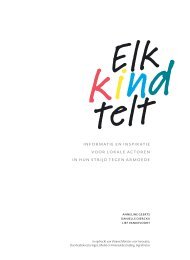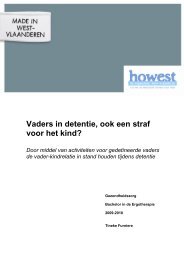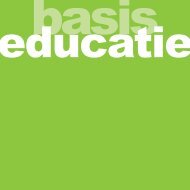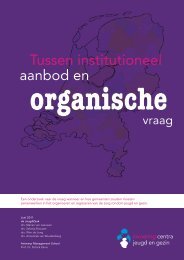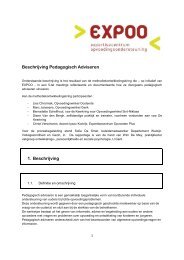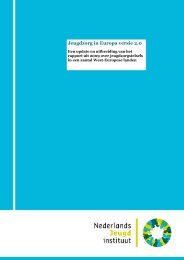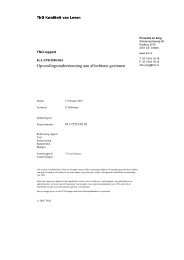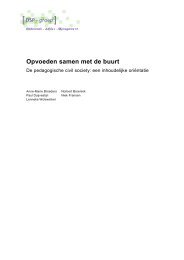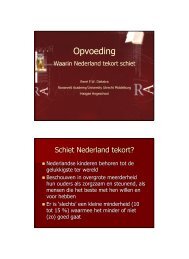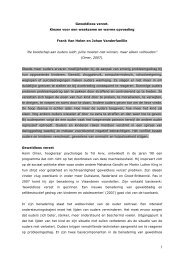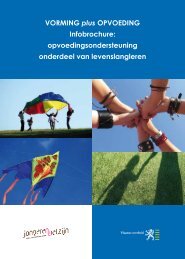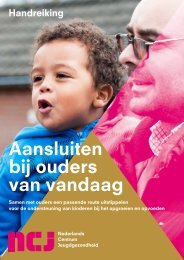attitudes. Such attitudes can surface in this way especially between groups from differentcultural backgrounds where there is also an inherent power imbalance betweenparticipating groups. Parenting programme developers could therefore include teambuilding exercises during the programme training phase. These could be designed so thedevelopment process itself models professionals shifting power towards service user parenttrainers (parents who have previously completed a programme and then train asprogramme facilitators). Experience tells us that this can also increase professionals’respect for the importance of the multiple and often lay kinds of knowledge that arehelpful in successfully engaging with so called ‘hard to reach’ parents. The importance ofthis insight is obvious. For example:Triple PTriple P has begun to explore engagement and acceptability for culturally and linguistically diverse(CALD) families. Evidence suggests professional gatekeepers are less readily engaged than parentsthemselves if they have the chance to access Triple P interventions (e.g. while some practitioners havereservations about the appropriateness of the positive parenting strategies for their specific CALDclient groups, the parents themselves rate the strategies as highly relevant and acceptable).However, including local parents from socially marginalised backgrounds at the table withmiddle-class, university graduate professionals may seem like a risky proposition for aprogramme developer. This could lead to core effective components of the programmebeing challenged, which we know should be avoided. We recommend that programmedevelopers identify what the effective core components of their particular programme arein advance of implementation so they can be clear that these cannot be changed. It is ourexperience that co-production teams respect the distinction between aspects of theprogramme that can be changed and those that cannot where the programme developershares the research that identified their programme’s core components in the first place,thereby explaining why certain features are non-negotiable. We also strongly recommendactively identifying aspects of the programme that can be adapted. This might involvebeing flexible about learning methods and content, programme location and times andwith whom and by whom the programme is facilitated. These options can then be offeredup for discussion and subsequent cultural adaptation by the co-production team. This canbe an empowering process in itself as it provides the opportunity for real ownership andcontrol to reside at the local level. Empowerment and ownership contribute to building apositive context for later sustainability as we will see later. For example:SNAPSNAP uses a variety of methods. Research ethics approval committees involve clients, and othercollaborators where indicated. Board members include parents who have accessed our services in thepast. People can participate as parent/peer mentors – parents, who have already completed the coreSNAP groups (e.g. SNAP Girls Club) are asked to co‐facilitate the subsequent SNAP group sessionswith the SNAP Leader – the mentor is typically involved in pre/debriefs following groups.Recommendations for enhancements and changes emerge during our regular on‐site consultationswith the aboriginal community leaders, programme staff and feedback from parents.44 Professional Practice Board
This way of working can also enhance the likelihood of successful parent trainerengagement in the programme. As the programme development process continues,co-production serves to enhance endurance in the relationships between professionals,parent trainers and programme participants. Such culturally congruent modelling andidentification can exert a powerful influence on learning.We have already seen how drop-out rates can vary by modifying the social context in whichpositive parenting is being taught. Modifying the social forms of learning adopted byprogrammes is also powerful. Didactic Powerpoint presentations and lectures with handoutsand handbooks for parents are common strategies used by parenting programmes.However, to parents in some cultures this can seem disrespectful as they may feel they arebeing taught like children and not want to come back. For parents who are less welleducated, illiterate, or where English is their second language, perhaps other learningstrategies should be implemented. Earlier we saw how video clips, using scenarios fromvaried cultural contexts, are being used to facilitate culturally congruent modellingopportunities. Role-play and other experiential learning increase accessibility for lowincome,socially marginalised parents. In some programmes both didactic lectures androle-plays are used. In programmes where whole families participate together, experientiallearning strategies are used to support low-income parents, who are often not literatethemselves or for whom English is their second language, so they are not additionallydisadvantaged or made to feel disempowered in front of their often more literate, Englishas a first language, children. For example:Incredible YearsWithin the IY programme there is no literacy requirement during the sessions, which are discussionand role-play based. The buzzes (talking in pairs), brainstorms and discussions ensure that parentsthink about the reasons why they should do things, for example, playing with their children. Parentsthen identify principles, by looking at the video vignettes, things that they think might be helpful forchildren in different situations, and these ideas are practised in the group. The collaborative process isthe key to the high rates of engagement and retention within the IY programme. Hand-outs,handbooks and other resources are offered to parents to support their learning, should that be theirwish, but also that these can be provided in different ways, pictorially or through a CD recording ofthe IY book and so on.Programmes with the lowest drop-out rates for low-income parents only use experientiallearning (McDonald et al., 2012). Programmes that are co-produced by culturallyrepresentative parents can more readily road test their decisions about which role models toadopt and what scenarios to enact with them, than programmes that are not co-produced.In practice the cultural adaptations described here are far less complex than theunderlying theory and are often surprisingly quickly understood by lay people as beingrecognisable parts of their own cultural mores and to be a good fit with their own lifeexperience and intuitive theories. Good theory is easily recognised as common truth!We should not underestimate the universality of social learning approaches. To illustratethis further, social learning theory has been applied to an adjacent field, peer-to-peerworking in adult mental health services. Whilst such approaches have rarely been<strong>Technique</strong> <strong>Is</strong> <strong>Not</strong> <strong>Enough</strong> 45
- Page 1 and 2: Professional Practice BoardTechniqu
- Page 3: ContentsAcknowledgements ..........
- Page 6 and 7: We also wish to thank Sarah Fitzroy
- Page 8 and 9: alienation and sense of isolation f
- Page 10 and 11: A range of these programmes are rec
- Page 12 and 13: 2. Vision and purpose2.1. The brief
- Page 14 and 15: From this conference a commitment t
- Page 16 and 17: development strategies have been us
- Page 18 and 19: 3. The socio-political context3.1.
- Page 20 and 21: Box 1: UNODC compilation of evidenc
- Page 22 and 23: cost-effective and it has caused so
- Page 24 and 25: Positive ActionPositive Action was
- Page 26 and 27: ■Programmes must have robust evid
- Page 28 and 29: These principles are based on our a
- Page 30 and 31: families who might benefit. This pr
- Page 32 and 33: providers and partner agencies were
- Page 34 and 35: Positive Parenting Programme (Tripl
- Page 36 and 37: multiple approaches that also inclu
- Page 38 and 39: need to learn English in their pare
- Page 40 and 41: Parenting programmes that work in m
- Page 42 and 43: 5. Principle 2. Cultural sensitivit
- Page 44 and 45: Positive ActionPositive Action faci
- Page 48 and 49: developed purely from a theory-driv
- Page 50 and 51: cultural heritages lecture at them.
- Page 52 and 53: having reciprocal relationships to
- Page 54 and 55: first started delivering the progra
- Page 56 and 57: Strengthening Families ProgramWhen
- Page 58 and 59: 7. Principle 4. Sustainability: Cre
- Page 60 and 61: operate at different levels. Some a
- Page 62 and 63: Incredible YearsAnother component o
- Page 64 and 65: commissioners can have more confide
- Page 66 and 67: Incentives for achieving model fide
- Page 68 and 69: 8. A framework for ensuring that ev
- Page 70 and 71: 9. Next stepsEvidence-based parenti
- Page 72 and 73: 70 Professional Practice Board
- Page 74 and 75: 72 Professional Practice Board
- Page 76 and 77: ReferencesAlinsky, S.D. (1971). Rul
- Page 78 and 79: Davidson, G. & Campbell, J. (2007).
- Page 80 and 81: Heindrichs, N., Bertram, H., Kusche
- Page 82 and 83: McDonald, L., FitzRoy, S., Fuchs, I
- Page 84 and 85: Spoth, R., Redmond, C., Hockaday, C
- Page 86: The British Psychological SocietySt



